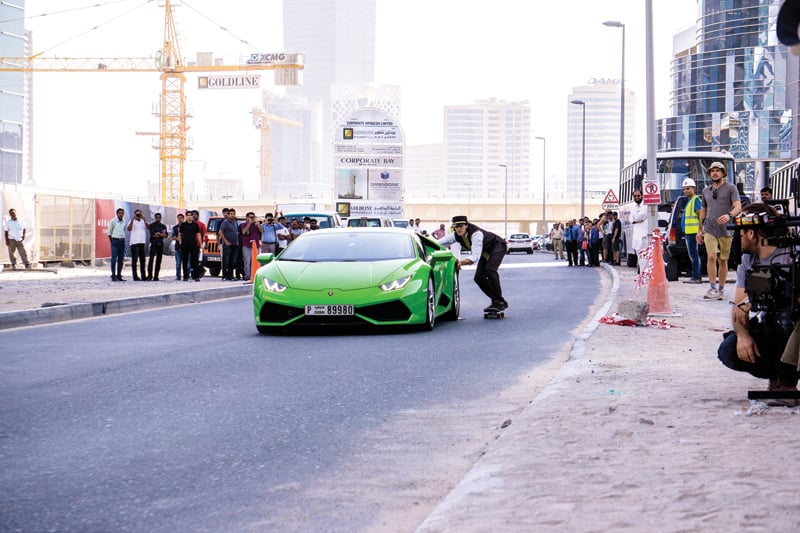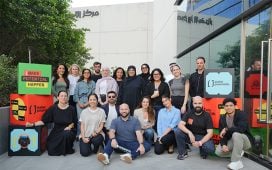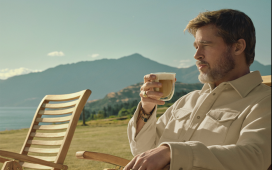As shooting wraps in Dubai on JW Marriott’s latest shortfilm, Eleanor Dickinson asks whether branded content on this scale really works

What happens when you get two former Disney execs together and tell them to make an ad? The result is 17 minutes of dramatic stunts, comic punchlines and a mission to save a suitably attractive businesswoman played by Slumdog Millionaire star Frida Pinto. And at the centre of all this high-octane tomfoolery is the JW Marriott Marquis
in Dubai.
But according to Sandra Schultze, the region’s senior director of brand marketing and ecommerce, the world’s tallest hotel should be the last thing you see. “Red Bull and GoPro have definitely proved that content can be brave,” she says. “So Red Bull is now more famous for their sport industry and the crazy stunts they do, and then they do a drink as well, but it’s really about the content created so people really enjoy what they see. And then they are really encouraged by the content and then the product, so the product is really the last part rather than being the first.”
Content marketing of hotels on a big studio scale is nothing new – Lost in Translation did so with Tokyo’s Grand Hyatt way back in 2003, while 2009’s Up in the Air – starring George Clooney – memorably featured the Hilton through a partnership between the hotel chain and the production company. However, the soon-to-be world’s biggest hoteliers Marriott went one step further and formed its very own content studio, hiring former Hollywood bigwigs Karin Timpone and David Beebe to oversee operations.
And now two films later, including the original Two Bellmen, filmed at the LA Marriott, and the Paris-set French Kiss the studio hopes to capitalise on Dubai’s Marriott Maquis’ status as the world’s tallest hotel. Costing “close to” a million dollars, the film even stars Dubai comedian Ali Al Sayed to help maximise its appeal to the regional market.
But is it all just hype?
“French Kiss generated over $500,000 in room revenues as part of the movie,” says Schultze. “Content creates communities and it really creates a return on investments. It will be interesting to see if we are as successful as the team in Paris. We are working on several room packages now. It’s not enough to create the content but how you leverage it as well.”
Despite the filming only just wrapping on the sequel, a third instalment set “somewhere in Asia” has already been planned, indicating perhaps just how much confidence the team has in its return.
Undoubtedly the key target of Marriott’s films is the so-called ‘millennial’ generation who, according to Schultze, tend to associate the hotel brand with luxury and, perhaps most unflatteringly, the place grandparents go with their air miles. “For them it’s not about a specific brand, it’s more about the location, where you get wi-fi. Nobody cares about breakfast because you want to have breakfast at the local café. We need to tap into Generation Y when it comes to loyalty so we can ensure they stay with us whenever they can and whenever they want to so that we are part of their choice, which I think a lot of time in the past we haven’t been.”
But, as The Economist’s Nicholas Sennegon pointed it out in the previous edition of Campaign, this generation is more discerning of the content they are being fed. So surely they see right through such films?
That’s true, according to Rami Salame, director of creative strategy at OMG-owned content specialists Fuse but doesn’t actually matter. “[Consumers] don’t mind; that’s what makes branded entertainment so much fun to work on,” he says. “If done right, and it matters to viewers, they don’t care whether a brand made it or a Hollywood studio. [Two Bellmen] was not heavily branded. It was a movie that merits watching. It was self-aware without being apologetic, and I loved that JW Marriott was not afraid to make fun of itself, its clientele (very brave) and its staff. This movie stands for something, without trying to please
everyone. That’s what art looks like.”
He adds: “With people’s ability to download movies and music free, legally or otherwise the future of content is going to rely on brands because they have the need to remain a part of people’s lives. Movies, songs, short films and even offline entertainment (theme parks, hotels etc.) will be funded by brands who are seeking genuine, meaningful interaction with their audience. With people seeking experiences more than they are seeking material things, hotels will need to be providers of content to draw attention to themselves as purveyors of experiences.”
For the MENA-based marketing team, the public relations train of rebranding themselves as ‘purveyors of experiences’ starts now, ahead of January’s premier held at the JW Marriott Marquis. As Schultze admits, making buzz marketing activations is tricky in the region as “the market is not used to it”. However, she remains optimistic, adding: “I think, or I hope, this will be a best-case scenario where we can showcase what has been done to this whole world.”









